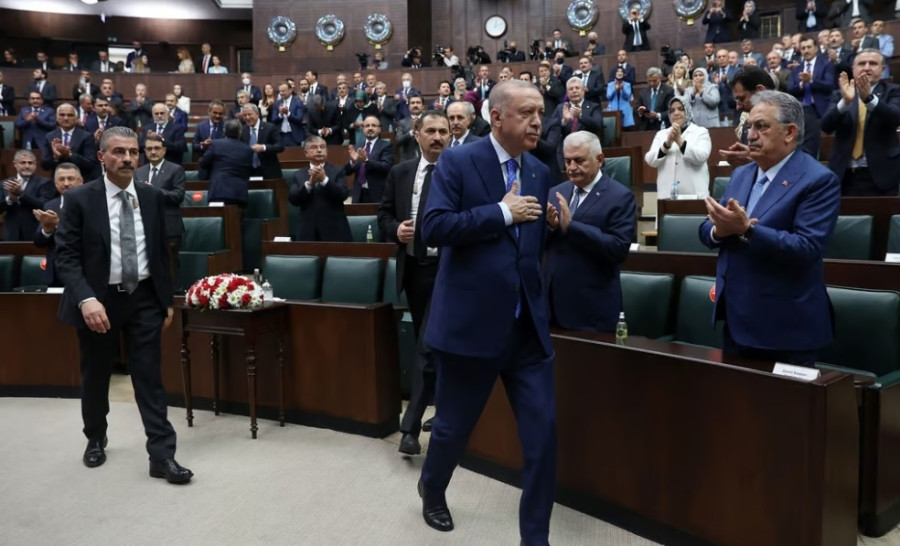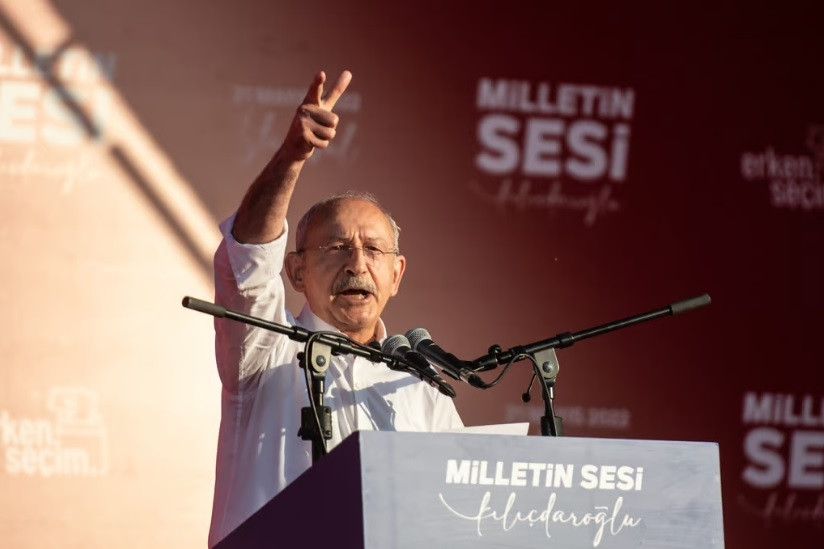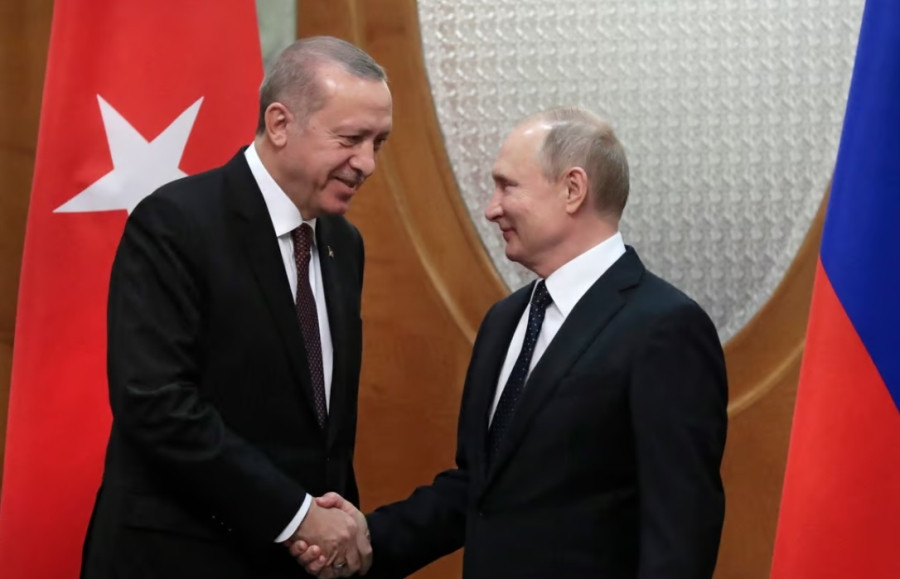The May 14 election in Türkiye is a pivotal moment for security in Europe and the Middle East.

The May 14 vote is expected to be the most closely contested in Erdogan's 20 years in power. Photo: AFP
For Turkish President Recep Tayyip Erdogan, next month's election is of historic significance. The May 14 vote is expected to be the most closely contested in Erdogan's 20 years in power.
The election will weigh heavily on security in Europe and the Middle East, as the winner will determine: Türkiye's role in the North Atlantic Treaty Organization (NATO); its relations with the United States, the European Union (EU) and Russia; migration policy; Ankara's role in the conflict in Ukraine; and how to handle tensions in the Eastern Mediterranean.
Mr Erdogan is now up against opposition heavyweight Kemal Kılıcdaroglu, who has pledged to bring about major changes. Polls show Mr Kılıcdaroglu has a larger support base than the incumbent, but Mr Erdogan is an experienced campaigner, backed by strong state power and the institutions that follow.
“There will be a shift from individual-oriented governance to team-oriented governance,” said Unal Cevikoz, Mr. Kılıcdaroglu’s chief foreign policy adviser. “Mr. Kılıcdaroglu will be the ‘conductor’ of that team.”
Here are the key foreign policy topics related to the Turkish election:
EU and Türkiye accession negotiations
Türkiye’s opposition is confident it can unlock EU accession talks – deadlocked since 2018 – by introducing liberalising reforms on the rule of law, media freedom and depoliticising the judiciary.
The opposition also pledged to implement decisions by the European Court of Human Rights calling for the release of two of Mr Erdogan's most prominent political opponents who are in prison: co-leader of the pro-Kurdish Peoples' Democratic Party Selahattin Demirtas and human rights defender Osman Kavala.
“This is simply sending a message to all our allies and all European countries that Türkiye is returning to the path of democracy,” Mr. Cevikoz said.

Mr. Kemal Kılıcdaroglu, President Erdogan's opponent in the upcoming election. Photo: Politico
Even with a new administration, however, the task of reopening talks on Türkiye's accession to the EU is daunting. Wolfango Piccoli, co-founder of risk analytics firm Teneo, argues that "anti-Western" sentiment in Turkey is strong across the political spectrum.
“Foreign policy will depend on the cohesion of the coalition in government. This is a coalition of parties that have nothing in common except the desire to defeat Erdogan. They have very different agendas and this will have an impact on foreign policy,” Piccoli said, noting that any new government will have a lot of internal issues to deal with so its main focus will be on domestic affairs.
Meanwhile, Europe also appears unprepared for a Türkiye with a new government, with a group of countries – most notably France and Austria – particularly opposed to the idea of mending ties.
“They are used to the idea of a non-aligned Türkiye, which has moved away from EU norms and values and is making its own way,” said Aslı Aydıntaşbaş, a fellow at the Brookings Institution. “If the opposition forms a government, they will seek a European identity and we don’t know what the European response to that will be; whether it could be integration or a new security framework that includes Türkiye.”
For his part, Sinan Ülgen, a former Turkish diplomat and senior fellow at the Carnegie Europe think tank, said: “It is clear that there has been an erosion of trust between the two sides, such as the customs union, visa liberalization, climate cooperation, security and defense, and the migration agreement.”
NATO and the United States
After initially imposing a veto, Türkiye finally gave the green light to Finland’s NATO membership on March 30. But the opposition has also pledged to go further by ending Türkiye’s veto on Sweden, saying it could be done by NATO’s annual meeting on July 11.
Many also speculate that if Erdogan is re-elected, Ankara might also agree to Sweden joining NATO. After all, NATO allies played a key role in providing earthquake aid to Türkiye. Turkish presidential spokesman İbrahim Kalın said the door was not closed to Sweden, but insisted it was Stockholm’s responsibility to determine how things would play out.
Ankara's military ties with Washington deteriorated sharply in 2019 when Türkiye purchased the Russian-made S-400 missile system, a move the US said would put NATO aircraft flying over Turkey at risk. As a result, the US removed Ankara from the F-35 fighter jet program and sanctioned the Turkish defense industry.
A meeting in late March between Mr. Kılıcdaroglu and US Ambassador to Ankara Jeff Flake angered President Erdogan, who saw it as election interference and vowed to “close the door” on the US ambassador. “We need to teach America a lesson in this election,” Mr. Erdogan told voters.
In its policy, the opposition also mentioned the desire to return to the F-35 program.
Russia and the conflict in Ukraine
Since the outbreak of the Russia-Ukraine conflict, Türkiye has portrayed itself as a mediator. It has continued to supply weapons—most notably Bayraktar drones—to Ukraine while refusing to sanction Russia. It has also brokered a deal with the United Nations to allow Ukrainian grain exports to pass through the blockaded Black Sea.
After giving the green light to Finland's NATO membership, Erdogan is suggesting that Türkiye could be the first NATO member to host Russian President Vladimir Putin.

Turkish President said he is ready to meet Russian President Putin in Ankara. Photo: AFP
“There is a possibility” that Mr Putin could visit Türkiye on April 27 to attend the inauguration of the country’s first nuclear power reactor built by Russia’s state nuclear energy company Rosatom, Mr Erdogan said.
On the opposition side, Mr. Cevikoz said that under the leadership of Mr. Kılıcdaroglu, Türkiye would be ready to continue playing the role of mediator and extend the grain deal, but increase pressure on Moscow as a NATO member.
“We just emphasize the fact that Türkiye is a member of NATO and in our discussions with Russia we will certainly seek equal relations, but we will also remind Russia that Türkiye is a member of NATO,” Cevikoz said.
Syria and migration
The opposition says Türkiye's role in Syria depends largely on how it can resolve the issue of Syrians living in Türkiye.
Türkiye hosts some 4 million Syrians and many Turks are struggling with a major cost of living crisis and have become increasingly hostile towards Syrian refugees. Mr. Kılıcdaroglu has pledged to create opportunities and conditions for Syrians to voluntarily return home.
“Our approach is to restore the Syrian economy and facilitate voluntary repatriation,” Cevikoz said, adding that this would require international burden-sharing, but also establishing dialogue with Damascus.
Meanwhile, President Erdogan is also trying to establish a cooperative relationship with Syria, but Syrian President Bashar al-Assad said he would only meet the Turkish President when Ankara was ready to completely withdraw its troops from northern Syria.
“A new Turkish government will be more active in negotiating with the Syrian government. But this will still be a thorny issue because there will be conditions attached to the Syrian side regarding this normalization,” said Ülgen.
However, expert Piccoli noted that Syrians who voluntarily return are “dreamy”: “These are Syrians who have lived in Turkey for more than 10 years, their children have been studying in Türkiye since the very beginning. Therefore, voluntary commitments to return are very difficult to implement.”
Tensions with Greece and the Eastern Mediterranean
Türkiye has been tough on Greece in recent months, with President Erdogan warning of a possible missile strike on Athens. But the Greek government’s swift response to the recent devastating earthquake in Turkey and a visit by Greek Foreign Minister Nikos Dendias have created a new context for bilateral relations.
Mr. Dendias, together with his Turkish counterpart Mevlüt Çavuşoğlu, announced that Ankara would vote for Athens in its campaign for a non-permanent seat on the United Nations Security Council for the 2025-2026 term and that Greece would support Turkey's candidacy for the post of Secretary-General of the International Maritime Organization.
In another sign of the thaw, Greek Defense Minister Nikos Panagiotopoulos and Migration Minister Notis Mitarachi visited Türkiye this month. Turkish Defense Minister Hulusi Akar said he hoped the Mediterranean and Aegean would become “seas of friendship” between the two countries.
According to Mr. Cevikuz, the resumption of friendly relations between Türkiye and Greece on bilateral issues [in the Aegean], will facilitate the coordination of solving other issues in the Eastern Mediterranean, which are in a more multilateral format, such as disputes over maritime borders and energy exploration.
According to Tin Tuc Newspaper